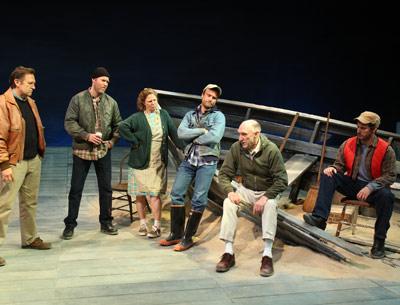‘Men’s Lives’: Lessons, Magic

“Men’s Lives,” the 20-year-old play about the disappearance of a South Fork way of life by Joe Pintauro, opened as a revival Saturday night at the Bay Street Theatre in Sag Harbor, the same theater in which it received its debut production.
When an audience is told how to feel, it usually stops feeling. Allow the audience, as this play often does, to find its own way as the story unfolds on the stage and it will feel, and more important, care about what the author cared about.
Mr. Pintauro has a rich, lyrical voice. When that voice is channeled through this very talented cast, the results are gripping.
The story, adapted from the best-selling nonfiction book by Peter Matthiessen, follows the disintegration of a family, both spiritually and physically, when its traditional way of life, particularly fishing the oceanfront for striped bass with large nets, is ripped away from it. That story is chronicled by an outsider, Peter, played by Victor Slezak.
It is a fictionalized vision of the impact New York State’s decision to ban haulseining had on the local fishing community some 20 years ago.
The driving force in the family is the mother, Alice, brilliantly played by Deborah Hedwall. “Time and money don’t matter to us,” she says, it is a way of life that she is defending.
Fairly early in the play, she confides in Peter about a dream she has been having. “I wake up in my own coffin,” she says, describing an apocalyptic vision of the future, where the great homes of the rich are gone, as is the humble oceanfront shack in which she has raised her three sons, all replaced by desolation. It is a moving moment in the play.
However, part of the play, particularly in the second half of this one-and-a-half-hour production with no intermission, slips into agitprop.
In John Ford’s genius film adaptation of John Steinbeck’s “The Grapes of Wrath,” there is a moment when a Caterpillar tractor is about to plow under a sharecropper’s home.
The sharecropper and his family stand guard, resolute, shotguns aimed at the approaching tractor, until they realize the driver is a boy they know.
It is a powerful juxtaposition that confronts the audience, without words, and is repeated thematically in that script, and lacking in “Men’s Lives.”
Here, we are told that the fishermen are being crushed by the rich, the sportsfishermen, and the gutless politicians. Those doing the plighting become stick figures, not human, the faceless “them.”
There is no ambiguity here.
Twice, we briefly meet the opposition, a sportsfisherman who owns an ad agency, and a state senator, both characters well played by Mark Coffin, who has wonderful comic timing.
But these two appearances bring us no closer to understanding the forces that are destroying the local baymen.
It is too bad, because there is so much to love about this play.
There is a fine cast. Brian Hutchinson walks through the play, and ultimately into death, with a beer in his hand and a shot of booze in his belly. At the end, drowned by liquor and life, he describes his vision of an idyllic death, a vision that could only come from a true bayman.
This sequence is Mr. Pintauro at his best. Stunning.
Rob DiSario strikes the right balance of hopefulness and hopelessness as the only family member with any true chance to survive.
Scott Thomas Hinson plays Popeye, an UpIsland fisherman now accepted into the family. He does a beautifully staged sequence of physical desperation toward the end that stays with you after the play.
Young Myles Stokowski handles his role with aplomb, as does Peter McRobbie as the father.
This play is laced with local history. When Mr. McRobbie talks about the family’s whaling roots, you can almost see the men on the shore, pushing out in their dories after the just-sighted whale.
Mr. Slezak, a very talented, polished actor, plays Peter thoughtfully, with a sense of insight, but much of the polemic nature in parts of this play are borne by his character. When about midway through the play, he tells the family that the state is going to pass a law banning net fishing from ocean beaches, the sequence of events that follows seems predictable, despite the family’s protestations.
The production values are superb, and well woven into the play. The set, by Andrew Boyce, evokes life on the ocean, as does the sound design by David Bullard. Ditto John McKernon’s lighting design, which nimbly takes us from day to night.
Harris Yulin’s direction weaves all the elements together, particularly the movement of the characters. His staging of the climax is wonderful.
If you are interested in the history of the South Fork fishing community, this play is a must-see. And even if you are not, there are some magical moments in this production that you will talk about after you’ve left the theater.
The one thing you will not be doing afterward is asking questions, because the answers have already been supplied.
